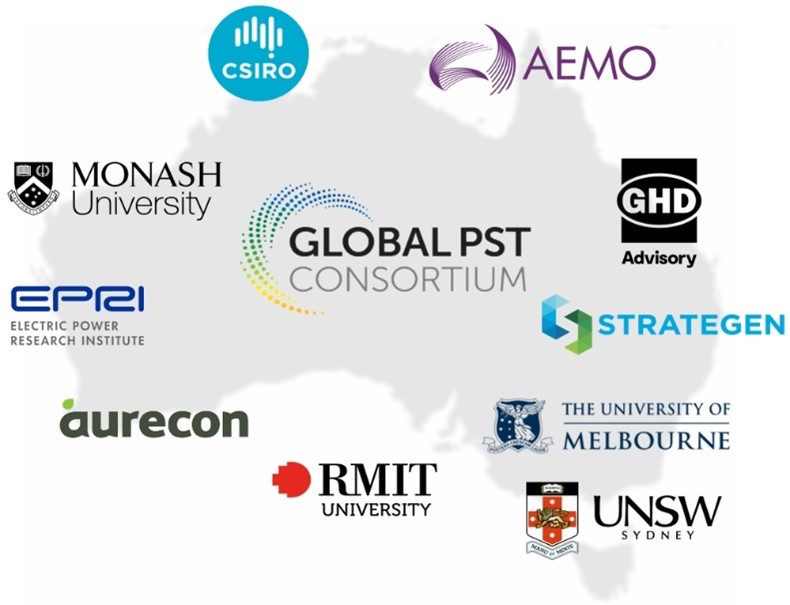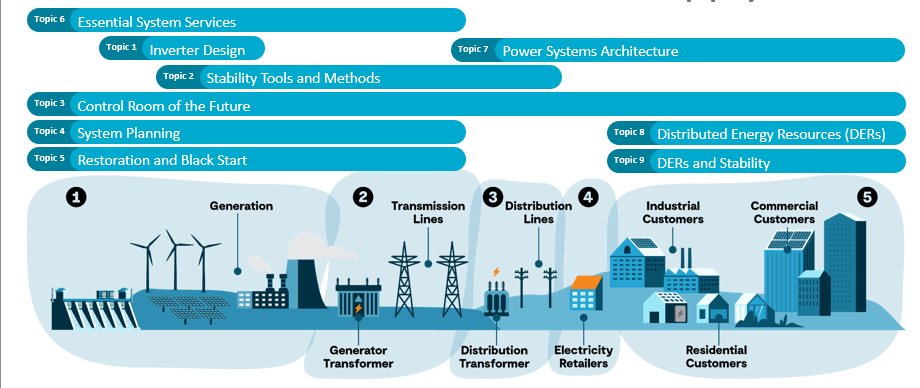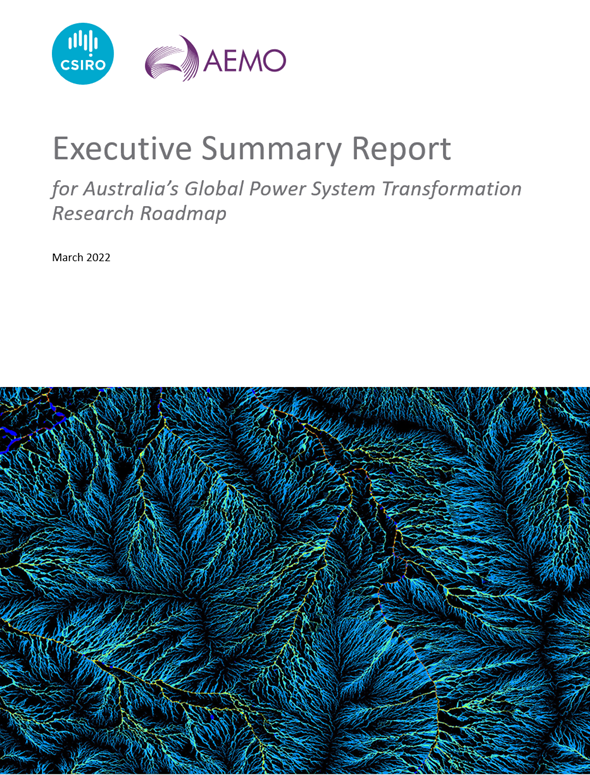Our global energy transition
The world is undergoing a clean energy transition at unprecedented speed, scope and scale. Making the transition requires collective problem solving across the value chain – from academia, to industry experts, to global system operators. Overcoming the challenges involved is urgent and vitally important for Australia, and the world.
Our major challenge is no longer the cost of renewable energy, instead, it is how to integrate this energy into our electricity systems. With plans for scaling back fossil fuel-based power over the next decade, the pressure is on to ensure the security, reliability and stability of Australia's future power systems with a high proportion of inverter-based resources. The hurdles involved range from solving technical issues, through to workforce training and developing new real-time operational tools. By tackling these challenges –in a collaborative way and sharing outcomes widely, Australian scientists and researchers are leading the way. Working together, we can ensure energy security for Australia during the energy transition while creating jobs, investment, export opportunities, earning global recognition and, most importantly, massively accelerating the transition to a low emissions electricity sector.
The G-PST Consortium and Australia's leadership
The international Global Power System Transformation (G-PST) Consortium was officially announced on April 21, 2021 with the visionary goal to "Dramatically accelerate the transition to low emission and low cost, secure, and reliable power systems, contributing to less than 50 per cent emission reductions over the next 10 years, with $2 billion of government and donor support for technical, market, and workforce solutions that unlock $10 trillion+ of private sector investment". The Consortium is led by the US and UK and has focused on solving the most pressing challenges to accelerate the decarbonisation of electricity system around the world.

CSIRO and the Australian Energy Market Operator (AEMO) are Australian representatives in the Consortium. Working together, we have invited and been driving Australian universities and research institutions, and international research institutes to solve the most pressing challenges in order to accelerate the decarbonisation of our electricity system. These challenges informed the identification of nine research topics:
- Inverter Design – Development of capabilities, services, design methodologies and standards for Inverter-Based Resources (IBRs) to ensure power system reliability.
- Stability Tools and Methods – New tools and methods are required to ensure reliability, security and stability in power systems with more IBRs, as traditional synchronous machines continue to be phased out.
- Control Room of the Future – Development of new technologies and approaches for enhanced real-time visibility and analysis in power system operator control rooms.
- Planning – New planning metrics, methods, and tools to capture the characteristics and influence of a changing resource mix.
- Restoration and Black Start – Creating new procedures for black starting and restoring a power system with high or 100% IBR penetration.
- Services – Quantifying the technical service requirements of future power systems to maintain the supply-demand balance reliably and at least cost with higher penetration of renewables.
- Architecture – Identifying appropriate future power system architectures for coordinating new technology capability, regulatory approaches, market design, and the distribution/transmission interface in a highly distributed, variable renewable energy-based system to support an orderly power system transition.
- Distributed Energy Resources (DERs) – Investigating the challenges and opportunities from very high levels of DERs to make power system control and operation more effective.
- DERs and Stability – Modelling and analysis of DER dynamic responses to ensure system operators can maintain power system security under very high DER penetration.

Australia's Global Power System Transformation Research Roadmap
Working with leading Australian and international engineering, academic and research partners, CSIRO and AEMO have produced a Research Roadmap that incorporates research plans for the nine most pressing research topics. The Roadmap shows how Australia could lead the way in solving the global challenge of integrating renewable energy into electricity networks and accelerating the decarbonisation of the energy sector.
Specifically, the whole Research Roadmap provides both high-level and detailed descriptions of the purpose and objectives of each of the nine research plans, including the high priority tasks proposed to be delivered in the short term. The nine research plans and the accompanying documents also outline why the research specified in the Roadmap is critical to Australia, how the outcomes apply to Australia, and how Australian research can contribute to the meeting the Consortium’s goals in. In addition, the expected timeline and associated risks to deliver the Research Roadmap are also provided.

What’s happened so far?
The Research Roadmap is being put into action, helping to facilitate Australia’s transition to a stable, secure and affordable power system. The research completed to date confirms that a huge body of work is needed across the industry over the next several decades. This will require a significant increase in the depth and breadth of power system engineering expertise both in academia and industry. Our work is helping build the foundation for this.
Reports from stages Two and Three of the work, the first two years of research following the development of the roadmap, can be accessed via the links below. Stage four of the research is currently in progress for financial year 2024/2025.
Stage One of the work (the Roadmap, that is, the research plan) can be accessed by downloading Australia's G-PST Research Roadmap and accompanying Stage One research plans listed directly below.
Download Australia's G-PST Research Roadmap and accompanying documents.
Stage One: Australia's G-PST Research Roadmap
- Research plan for Topic 1: Inverter Design
- Research plan for Topic 1: Inverter Design
- Research plan for Topic 2: Stability Tools and Methods
- Research plan for Topic 2: Stability Tools and Methods
- Research plan for Topic 3: Control Room of the Future
- Research plan for Topic 3: Control Room of the Future
- Research plan for Topic 4: Planning
- Research plan for Topic 4: Planning
- Research plan for Topic 5: Blackouts and System Restoration
- Research plan for Topic 5: Blackouts and System Restoration
- Research plan for Topic 6: Services
- Research plan for Topic 6: Services
- Research plan for Topic 7: Architecture
- Research plan for Topic 7: Architecture
- Research plan for Topic 8: Distributed Energy Resources (DERs)
- Research plan for Topic 8: Distributed Energy Resources (DERs)
- Research plan for Topic 9: DERs and Stability
- Research plan for Topic 9: DERs and Stability
Request accessibility assistance
Some elements of the documents included on this page may not be accessible to assistive technologies. Please contact us to request further accessibility assistance.
Our global energy transition
The world is undergoing a clean energy transition at unprecedented speed, scope and scale. Making the transition requires collective problem solving across the value chain – from academia, to industry experts, to global system operators. Overcoming the challenges involved is urgent and vitally important for Australia, and the world.
Our major challenge is no longer the cost of renewable energy, instead, it is how to integrate this energy into our electricity systems. With plans for scaling back fossil fuel-based power over the next decade, the pressure is on to ensure the security, reliability and stability of Australia's future power systems with a high proportion of inverter-based resources. The hurdles involved range from solving technical issues, through to workforce training and developing new real-time operational tools. By tackling these challenges –in a collaborative way and sharing outcomes widely, Australian scientists and researchers are leading the way. Working together, we can ensure energy security for Australia during the energy transition while creating jobs, investment, export opportunities, earning global recognition and, most importantly, massively accelerating the transition to a low emissions electricity sector.
The G-PST Consortium and Australia's leadership
The international Global Power System Transformation (G-PST) Consortium was officially announced on April 21, 2021 with the visionary goal to "Dramatically accelerate the transition to low emission and low cost, secure, and reliable power systems, contributing to less than 50 per cent emission reductions over the next 10 years, with $2 billion of government and donor support for technical, market, and workforce solutions that unlock $10 trillion+ of private sector investment". The Consortium is led by the US and UK and has focused on solving the most pressing challenges to accelerate the decarbonisation of electricity system around the world.
CSIRO and the Australian Energy Market Operator (AEMO) are Australian representatives in the Consortium. Working together, we have invited and been driving Australian universities and research institutions, and international research institutes to solve the most pressing challenges in order to accelerate the decarbonisation of our electricity system. These challenges informed the identification of nine research topics:
- Inverter Design – Development of capabilities, services, design methodologies and standards for Inverter-Based Resources (IBRs) to ensure power system reliability.
- Stability Tools and Methods – New tools and methods are required to ensure reliability, security and stability in power systems with more IBRs, as traditional synchronous machines continue to be phased out.
- Control Room of the Future – Development of new technologies and approaches for enhanced real-time visibility and analysis in power system operator control rooms.
- Planning – New planning metrics, methods, and tools to capture the characteristics and influence of a changing resource mix.
- Restoration and Black Start – Creating new procedures for black starting and restoring a power system with high or 100% IBR penetration.
- Services – Quantifying the technical service requirements of future power systems to maintain the supply-demand balance reliably and at least cost with higher penetration of renewables.
- Architecture – Identifying appropriate future power system architectures for coordinating new technology capability, regulatory approaches, market design, and the distribution/transmission interface in a highly distributed, variable renewable energy-based system to support an orderly power system transition.
- Distributed Energy Resources (DERs) – Investigating the challenges and opportunities from very high levels of DERs to make power system control and operation more effective.
- DERs and Stability – Modelling and analysis of DER dynamic responses to ensure system operators can maintain power system security under very high DER penetration.
Australia's Global Power System Transformation Research Roadmap
Working with leading Australian and international engineering, academic and research partners, CSIRO and AEMO have produced a Research Roadmap that incorporates research plans for the nine most pressing research topics. The Roadmap shows how Australia could lead the way in solving the global challenge of integrating renewable energy into electricity networks and accelerating the decarbonisation of the energy sector.
Specifically, the whole Research Roadmap provides both high-level and detailed descriptions of the purpose and objectives of each of the nine research plans, including the high priority tasks proposed to be delivered in the short term. The nine research plans and the accompanying documents also outline why the research specified in the Roadmap is critical to Australia, how the outcomes apply to Australia, and how Australian research can contribute to the meeting the Consortium’s goals in. In addition, the expected timeline and associated risks to deliver the Research Roadmap are also provided.
What’s happened so far?
The Research Roadmap is being put into action, helping to facilitate Australia’s transition to a stable, secure and affordable power system. The research completed to date confirms that a huge body of work is needed across the industry over the next several decades. This will require a significant increase in the depth and breadth of power system engineering expertise both in academia and industry. Our work is helping build the foundation for this.
Reports from stages Two and Three of the work, the first two years of research following the development of the roadmap, can be accessed via the links below. Stage four of the research is currently in progress for financial year 2024/2025.
Stage One of the work (the Roadmap, that is, the research plan) can be accessed by downloading Australia's G-PST Research Roadmap and accompanying Stage One research plans listed directly below.
Download Australia's G-PST Research Roadmap and accompanying documents.
- Factsheet PDF (511 KB)
- Factsheet PPTX (4 MB)
- Slide Summary PDF (3 MB)
- Slide Summary PPTX (44 MB)
- Executive Summary Report PDF (2 MB)
- Executive Summary Report DOCX (4 MB)
Stage One: Australia's G-PST Research Roadmap
- Research plan for Topic 1: Inverter Design PDF (949 KB)
- Research plan for Topic 1: Inverter Design DOCX (1 MB)
- Research plan for Topic 2: Stability Tools and Methods PDF (1 MB)
- Research plan for Topic 2: Stability Tools and Methods DOCX (1 MB)
- Research plan for Topic 3: Control Room of the Future PDF (3 MB)
- Research plan for Topic 3: Control Room of the Future DOCX (4 MB)
- Research plan for Topic 4: Planning PDF (2 MB)
- Research plan for Topic 4: Planning DOCX (33 MB)
- Research plan for Topic 5: Blackouts and System Restoration PDF (1 MB)
- Research plan for Topic 5: Blackouts and System Restoration DOCX (2 MB)
- Research plan for Topic 6: Services PDF (1 MB)
- Research plan for Topic 6: Services DOCX (2 MB)
- Research plan for Topic 7: Architecture PDF (11 MB)
- Research plan for Topic 7: Architecture DOCX (43 MB)
- Research plan for Topic 8: Distributed Energy Resources (DERs) PDF (5 MB)
- Research plan for Topic 8: Distributed Energy Resources (DERs) DOCX (2 MB)
- Research plan for Topic 9: DERs and Stability PDF (2 MB)
- Research plan for Topic 9: DERs and Stability DOCX (2 MB)
Request accessibility assistance
Some elements of the documents included on this page may not be accessible to assistive technologies. Please contact us to request further accessibility assistance.
